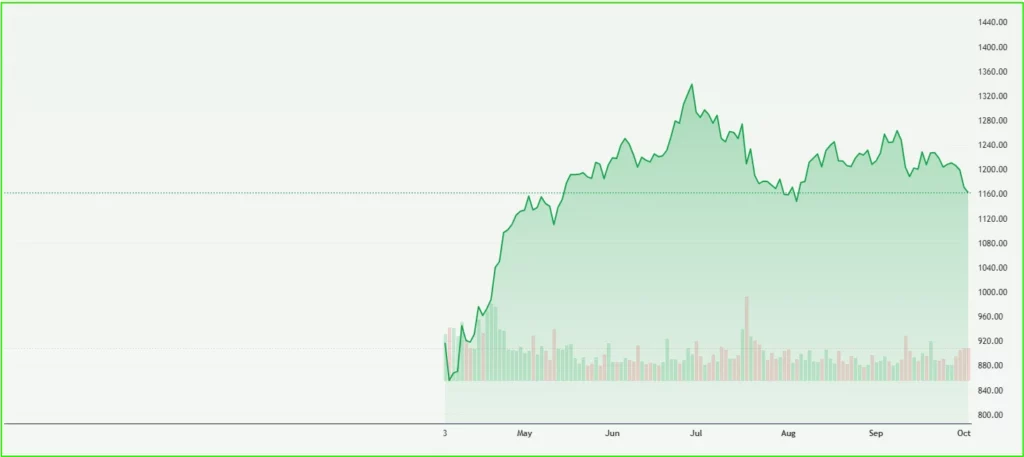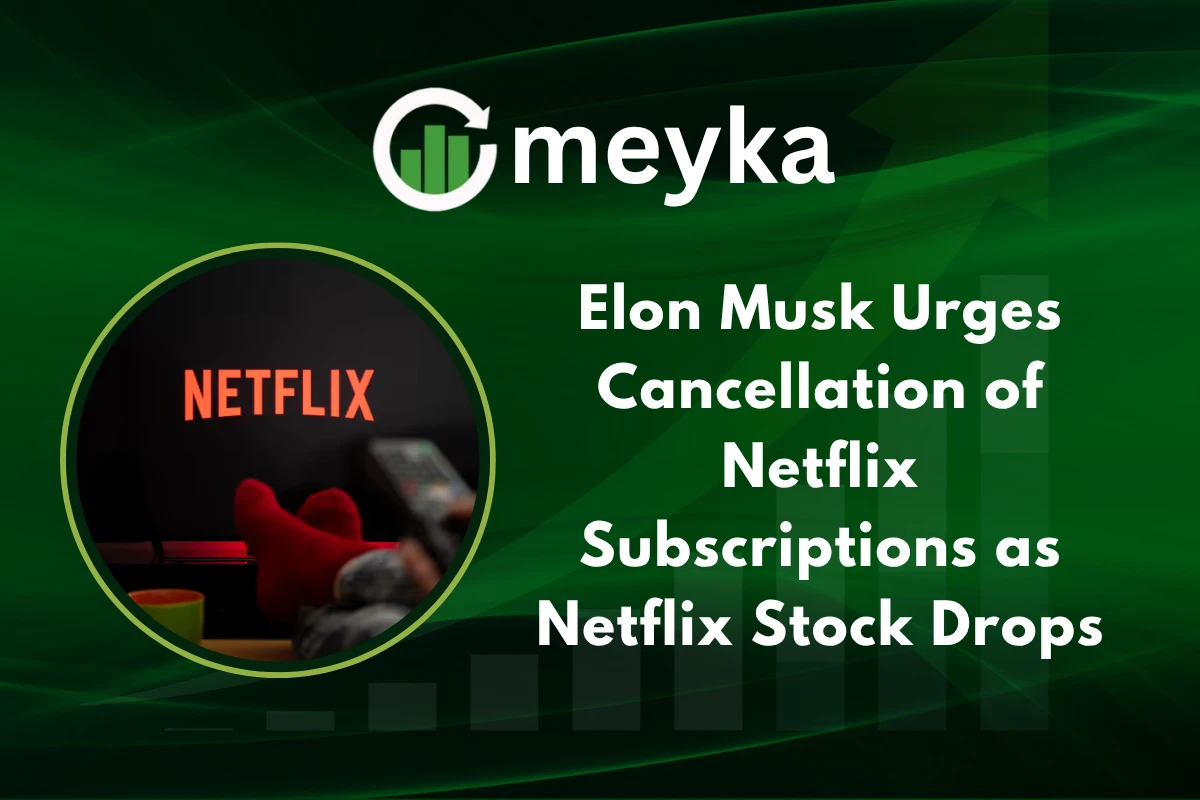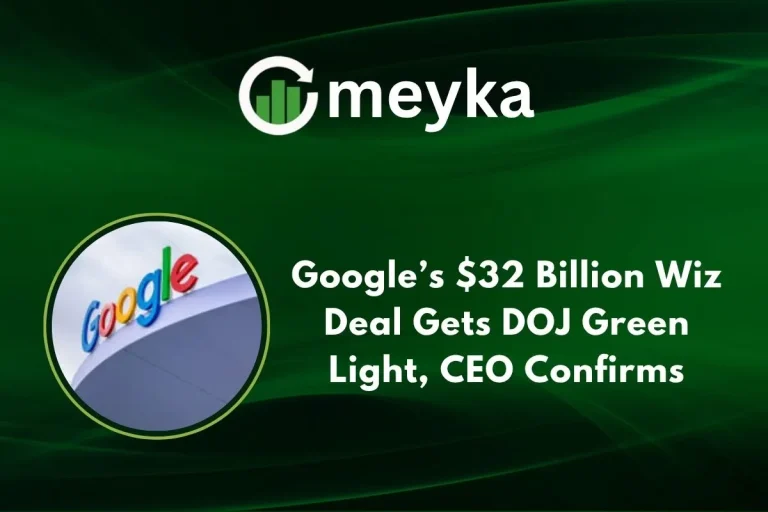Elon Musk Urges Cancellation of Netflix Subscriptions as Netflix Stock Drops
Elon Musk this week asked users to cancel Netflix subscriptions, igniting a wave of online debate and a sharp market reaction. His comments on X pushed the topic into trending conversations, and Netflix shares slid as investors reacted to the controversy.
In this article, we track the immediate Netflix stock update, how subscribers responded, and what analysts say about the short-term outlook for Netflix, the streaming market, and investor sentiment.
Netflix Stock Update After Musk’s Remarks

NTFLX stock value dip and Investor Reactions
Netflix (NFLX) lost around $15 billion in market value after Elon Musk urged cancellations, with shares down several percent over the span of a day and a half. The market cap reduction was widely reported and reflected intensified investor concern about subscriber growth and brand perception.
Analysts on Short-Term Impact
Analysts said the event is likely to cause short-term volatility, even if fundamentals stay intact for now. Some pointed to social listening metrics and subscriber churn as immediate risks, while others emphasized that content pipeline and fiscal guidance will matter more over the coming quarters.
Why did Netflix’s stock fall after Musk’s comments? The market reacted to a Netflix subscriber cancellations push and increased public scrutiny, creating investor worry about subscriber numbers and revenue.
Why Elon Musk Called Out Netflix
The Tweets That Sparked the Backlash
Elon Musk used his X account to urge people to cancel netflix for what he described as harmful content for children. The posts included direct calls to action that drove an Elon Musk tweet impact across platforms. The primary posts included:
Musk’s Previous Criticism of Media and Streaming
This is not the first time Elon Musk has criticized mainstream media or streaming firms; he has publicly weighed in on content issues and platform policies before, shaping public debate and corporate responses.
Commentators linked his phrasing to broader culture war themes, which helped the story gain traction across news outlets.
How Subscribers Reacted to Elon Musk’s Call
Social Media Trends and Viral Hashtags
The hashtag cancel Netflix trended after the tweets, and many users shared screenshots claiming they had canceled their memberships. That social proof reinforced the campaign and drew additional attention from the press and investors, boosting headlines that highlighted Netflix subscriber cancellations.
Global Response to the Cancellation Drive
Responses varied by market and region, but the overall pattern was a spike in conversations and some reported cancellations. Industry observers warned that a short-lived surge in cancellations is different from a structural subscriber decline, but the damage to public perception can be meaningful.
Why did Elon Musk ask users to cancel Netflix? He criticized the platform’s content direction and urged parents to protect children, prompting debate and some cancellations.
Wider Financial Implications for Netflix
Impact on Netflix’s Market Capitalization
The immediate market impact translated to billions in lost market value; the exact sums reported by financial outlets varied, but a notable figure cited was a decline of around $15 billion. That kind of movement underlines how sensitive market capitalization can be to reputational events.
Competitors Like Disney Plus and Amazon Prime are Positioned to Gain
Competitors such as Disney+ and Amazon Prime are well-positioned to capture wavering subscribers, particularly if Netflix faces a sustained perception problem. Industry analysts noted that streaming market reaction and content spend will influence long-term shifts. Critics also referenced AI Stock research when modeling potential subscriber movement across platforms.
Media Coverage and Expert Analysis
CNBC, Forbes, and India TV Reports
Major outlets covered the story with different angles, from market mechanics to culture and content debates. CNBC focused on the market reaction, Forbes examined the business implications, and India TV highlighted the cancellation trend among subscribers.
These reports together shaped a fuller picture of the event.
Long-Term Outlook for Netflix in Streaming Wars
Experts said long-term outcomes depend on subscriber retention, content investment, and strategic adjustments. Some analysts predicted a recovery if Netflix demonstrates steady earnings and subscriber stability, while others warned that repeated reputational hits raise the cost of acquisition and retention.
That analysis ties into AI Stock Analysis as firms incorporate social sentiment into models.
What Comes Next for Netflix and Investors
Subscriber Retention and Content Strategy Questions
Netflix faces questions about how to retain subscribers and whether to adjust content strategy or messaging. The company’s response, its guidance, and upcoming earnings will be watched closely by investors and analysts.
Market Predictions and Investor Guidance
Market watchers advised caution, noting that short-term price moves can exaggerate long-term value. Institutional analysts will likely update models, and retail investors may follow social trends that affect stock sentiment. Some investors are using AI Stock tools to simulate scenarios for streaming companies.
Investors will watch upcoming Netflix earnings, management commentary, and cancellation metrics closely. Boards and executives may revisit marketing and content plans, and shareholders could press for clearer guidance.
Short-term trading may be volatile, but long-term subscriber trends and revenue per user will be decisive. Analysts are running scenario models, and brokerages may update price targets as sentiment shifts. Retail investor reactions will also be tracked on social platforms.
Social Media and Video References
YouTube:
Conclusion
Elon Musk’s call to cancel Netflix subscriptions illustrates how a single influential voice can move public conversation and markets. The short-term drop in market value and spike in cancellations underscore the fragility of reputation in streaming entertainment.
For Netflix, the path forward will be defined by subscriber retention measures, content choices, and clear investor communication. Long-term recovery is possible, but the company must manage perception as carefully as the product. Take a deep breath and work on this problem step by step.
FAQ’S
Netflix stock is falling due to Elon Musk’s public call for subscription cancellations and rising investor concerns about subscriber growth and brand reputation.
Yes, reports confirm that Netflix lost over $15 billion in market value after Elon Musk’s remarks urged users to cancel subscriptions.
A $1000 investment in Netflix’s IPO in 2002 would now be worth hundreds of thousands of dollars, showing the power of long-term stock growth.
Elon Musk has not launched a public “AI stock,” but he is involved in AI-driven ventures like xAI, which could influence future market speculation.
The largest holders of Netflix stock are institutional investors such as Vanguard and BlackRock, along with company insiders like co-founder Reed Hastings.
Netflix has lost more than $15 billion in market value this week, with potential further losses if subscription cancellations continue.
Disclaimer
The above information is based on current market data, which is subject to change, and does not constitute financial advice. Always do your research.






